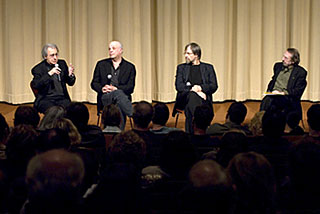

  |
|
|
||||||||||||||||||||||
|
FMS FEATURE... September 26, 2007 Academy Hosts "The Music Soundtrack" Series First of three-parter features top composers Schifrin, Fox and Kaczmarek by Jon Burlingame  Lalo Schifrin, Charles Fox, Jan A.P. Kaczmarek and Academy music-branch governor Charles Bernstein (the composer of such films as A Nightmare on Elm Street and the Oscar-winning documentary Maya Lin: A Strong Clear Vision) served as moderator of the three-and-a-half-hour event. The evening opened with examples of different musical approaches to the same scenes, using the DVD of Torn Curtain with the rejected Bernard Herrmann score and John Addison's replacement music. Schifrin – a six-time Oscar nominee whose work includes Cool Hand Luke, Bullitt, Dirty Harry, Mission: Impossible and the Rush Hour films – talked about the changes that technology has brought to his part of the business as well as "the amount of insecurity" that now seems to afflict many filmmakers. The result, he said, was two "detrimental" elements that occur prior to a composer recording his score: the "temp track," temporary music that is often assembled by "aspiring [or] mediocre composers," in his words, that often determines the musical direction of the film; and the "mockup" process, in which a composer is expected to create precise electronic demos of what the final cues (individual pieces of music) will sound like. "This is not a way to work," Schifrin said, calling the mockups "sterile, antiseptic – they have no life. There are emotions that happen with live musicians," he pointed out, along with the "overtones" that are produced when real instruments are played as part of an ensemble. Kaczmarek – the Oscar-winning composer of Finding Neverland, Unfaithful and Evening – agreed that the temp track can be "damaging" but also felt it could be a "helpful tool" when used properly. But these additional burdens, he said, sometimes make it "a never-ending battle to find your own voice" when composing a new score. Fox – the Grammy- and Emmy-winner who is best-known for such songs as "Killing Me Softly" and TV themes like Happy Days and Laverne & Shirley, but also a composer of such feature scores as Two-Minute Warning, Foul Play, The Other Side of the Mountain and 9 to 5 – addressed the issue of writing film music as just a part of a larger career. "You can't be a film composer until you're a composer," he said, noting that many individuals now come to film with little training in musical composition. Both Schifrin and Fox indicated that, back in the 1960s and '70s, there was no "temp track" to be emulated. Directors would listen to them play piano demos of themes and selected cues but otherwise trust their composers to do what was dramatically right for their films. Fox also pointed out that, when he first became interested in electronic music in the 1960s and began utilizing it in films in the 1970s (notably on the William Castle film Bug, originally titled The Hephaestus Plague), the idea was to "discover new sounds," not "emulating flutes" to save money on musicians. Bernstein asked about the creative process when composers first begin working on a new film. Kaczmarek talked about "instinctive, spontaneous reactions" to the film when he first sees it, writing music that he later revises when, as he put it, he goes into "a trance" near the end of the composing process. "Music and film both happen in time," said Schifrin. "They have rhythm and pace. The mission of the composer is finding the rhythm." He cited his work on John Boorman's film Hell in the Pacific, in which he asked for the sound effects of the cicadas on the island in order to compose in the same pitch for piccolos. He also elicited audience laughter when he discussed the problem of having already signed a contract to score a film based on a script and the film has turned out badly. "I lie to myself [and pretend] this is the best picture ever done," he said, in order to find sufficient inspiration. Kaczmarek discussed the variations between European filmmaking techniques and those in America. He said American films contain much more music than those in Europe and was concerned about this because "you can kill the sense of drama by overloading" a film with music. "I see us all as dramatists," Fox said later, "making the film better. A good director wants the creative input of the composer he's chosen," he added. "The Music Soundtrack" continues on Sept. 27 with composers Mychael Danna, Mark Isham and Rolfe Kent, moderated by Bruce Broughton; and Oct. 4 with composers George S. Clinton, Michael Giacchino and John Powell, and music editor Mike Flicker. ©2007 Jon Burlingame |
Search
Past Features
|